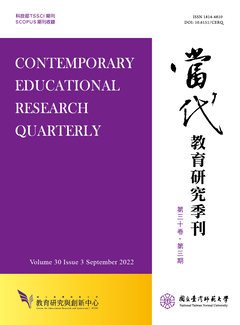

New Directions in Educational Research
2018 Special Issue of the Contemporary Educational Research Quarterly (CERQ)
Educational research plays a prominent role not only in the development of education as a field of study, but also in terms of shaping contemporary society. For one thing, research on education provides an evidentiary basis for policy decisions which have practical implications. Due to the high level of environmental complexity and new advanced technologies, emphasis is increasingly being placed on the need for creative and transformational research paradigms and methods. Recently, along with the local-global focus, there have been attempts to enhance the interaction between contemporary topics and innovations in the field of education, which normally embodies the following characteristics.
First of all, the field of education is grounded in multiple disciplines, such as psychology, sociology, politics, administration, neuroscience, statistics, information science, etc. As these varied disciplines serve as the foundation of this broader academic field, developments in them often serve as the impetus for breakthroughs and innovations in educational research. Second, the field of education can be categorized as a professional discipline with a high level of applicability as one of its defining features. Therefore, understanding how innovations in the various stages and facets of education (e.g. curriculum, teaching, assessment, administration, etc.) fit together to form an integrated whole will enhance the applicability of research results and lead to real practical improvements. Third, the field of education is characterized by changes and reforms. Nevertheless, educational policies are more often than not made in the absence of adequate research. In order to respond to the problems and challenges brought about by policy reform, educational research should analyze and evaluate the possible impacts that such reform may cause. Fourth, education, as a subsystem of society, is often affected by social change. Because social change is rapid, it is crucial to respond to it in timely fashion, or attempt to positively affect it. This means improving education by means of educational research. Fifth, in the era of globalization, trends in educational research and education reform in other countries can bring about opportunities for innovation in domestic education research and practice.
With the foregoing features in mind, this special issue welcomes research related to topics of interest including, but not limited to:
1. Innovative theories and research methods related to various subject fields and their application and practice in the field of education.
2. Analysis and evaluation of integration and innovation in relation to various stages, areas, and types of
education.
3. Research on educational reforms and its relation to various educational policies.
4. Investigation of the linkage between educational research and social change.
5. Exposition of new trends of educational research and educational reform in different countries
6. Discussion and reflection on the new directions of other educational research.
Important Dates
Full paper submission deadline: July 15, 2018
Notification of final decision: November 30, 2018
Guest Editor
Chih-Chien Yang, National Taichung University, Taiwan
Xin Lin Zhou, State Key Laboratory of Cognitive Neuroscience and Learning, Beijing Normal University, China
Managing Editor
Chuo-Chun Hsieh, National Dong Hwa University, Taiwan
Hsuan-Yi Huang, National Taiwan Normal University, Taiwan
Full paper submissions are due by July 15, 2018. The manuscript can be submitted in Chinese or English. The full manuscripts will be prepared in accordance with CERQ's Guidelines for Authors (please visit journal website: http://140.122.127.190/contemporary/en ) and subject to double-blind review based on the standard CERQ manuscript review criteria as well as relevance to the special issue. Full papers submissions must be done via online submission system (http://ojs.lib.ntnu.edu.tw/index.php/cerecerq/index). The results will be made available to authors on or before October 30, 2018, and they will have to make revisions in light of the reviewers’ feedback in 14 days. Accepted papers will be published in the December 2018 special issue of CERQ. For more information, please contact the Guest Editor at cerecerq@gmail.com

This work is licensed under a Creative Commons Attribution-NonCommercial 3.0 Taiwan License.
Center for Educational Research and Innovation, National Tawain Normal University
162, Ho-Ping East Rd, Sec. 1, Taipei, Taiwan | Tel:+886-2-7749-3670 | E-mail: cerecerq@gmail.com
CERI | NTNU | E-mail Alerts | Open Journal System
© 2014 CERI-NTNU
